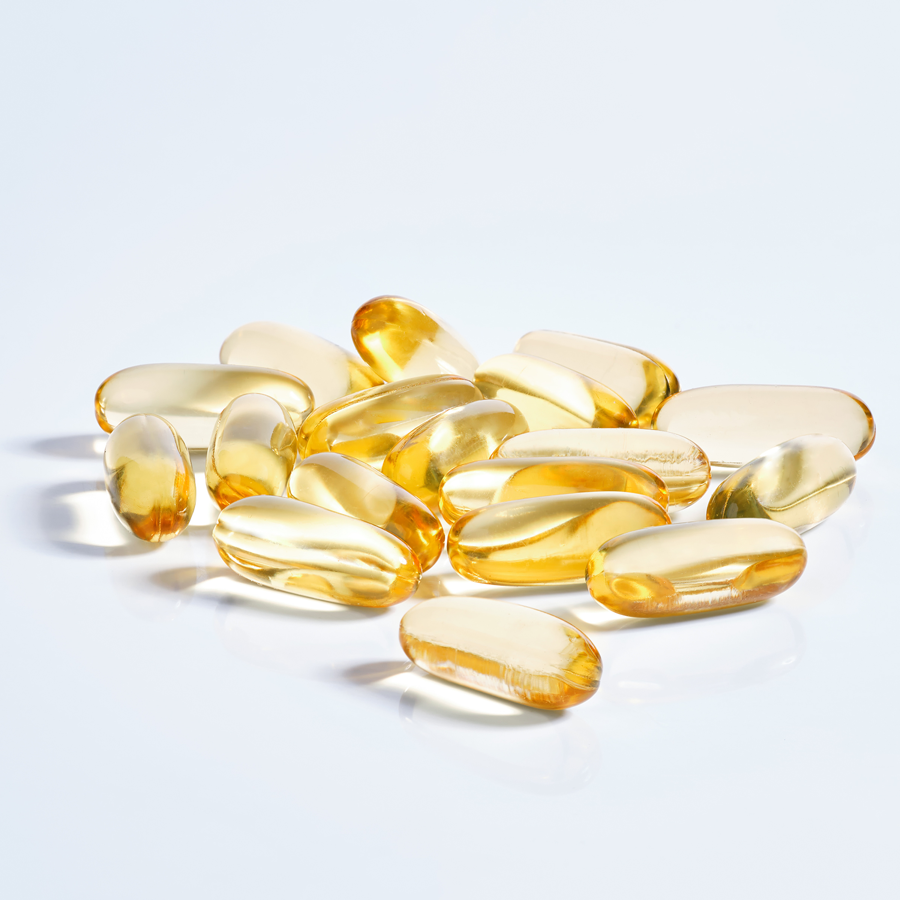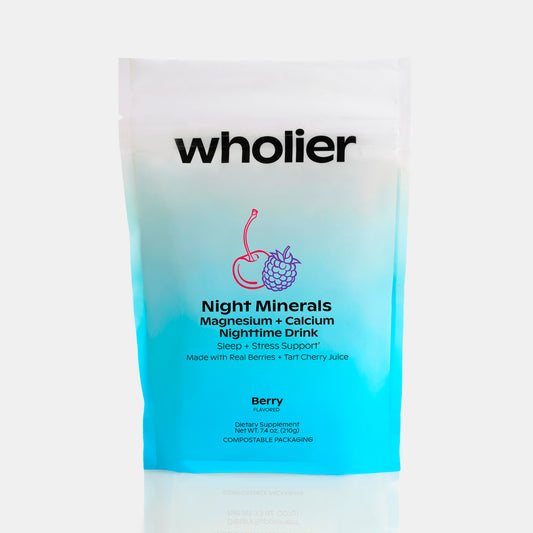
Understanding the 3 Types of Omega-3's and Why They Matter
You've probably heard about the amazing benefits of omega-3 fatty acids, but did you know there's more than one type? We're diving into the world of omega-3s, specifically ALA, DHA, and EPA. We'll explore the benefits, differences, and why it's essential to understand them for your wellness journey.
What Are the Different Types of Omega-3 Fatty Acids?
Omega-3 fatty acids are essential nutrients that our bodies can't produce on their own, so we need to obtain them through our diet or supplements.(1) There are three primary types of omega-3s: ALA (alpha-linolenic acid), DHA (docosahexaenoic acid), and EPA (eicosapentaenoic acid). Let's break them down:
- ALA: This is a plant-based omega-3, found in sources like flaxseeds, chia seeds, and walnuts.(2) Your body can convert ALA into DHA and EPA, but the process is quite limited.(3)
- DHA: Found mainly in fish and algae, DHA is essential for brain health, eye health, and overall development.(4)
- EPA: Also found in fish and algae, EPA plays a crucial role in reducing inflammation and supporting cardiovascular health.(5)
What Are the Benefits of Omega-3s?
Omega-3s offer a wealth of health benefits. Here are just a few:
- Improved brain function: DHA is crucial for brain development and maintaining cognitive function throughout life.(6)
- Heart health: EPA and DHA have been shown to lower triglyceride levels, reduce inflammation, and support healthy blood pressure.(7)
- Joint health: Omega-3s can help reduce inflammation and alleviate symptoms of arthritis.(8)
- Eye health: DHA is a major structural component of the retina and is essential for maintaining good vision.(9)
What's the Issue with Converting ALA into DHA and EPA?
While your body can technically convert ALA into DHA and EPA, the conversion rate is quite low.(10) Studies have shown that only about 5% of ALA gets converted to EPA, and less than 0.5% gets converted to DHA.(11) This means that relying solely on plant-based ALA sources may not provide enough DHA and EPA for optimal health.
Why Is It Important to Supplement with DHA and EPA?
Since our bodies struggle to efficiently convert ALA into DHA and EPA, it's essential to get these nutrients from direct sources. For most people, this means consuming fish or taking fish oil supplements. However, if you're following a plant-based diet or concerned about the environmental impact of fish consumption, algae-based supplements are a fantastic alternative.(12)
What Does Science Say About the Benefits of DHA and EPA Supplements?
Research has consistently shown the benefits of DHA and EPA supplementation. A study published in the American Journal of Clinical Nutrition found that DHA and EPA supplementation reduced the risk of cardiovascular events by 10% in people with high triglyceride levels and low HDL cholesterol.(13)
Another study showed that supplementing with DHA and EPA led to improvements in attention, processing speed, and memory in healthy adults.(14)
Research has also demonstrated that omega-3 supplementation can alleviate symptoms of depression and anxiety.(15)
Which Omega-3 Fatty Acid Should You Choose?
While ALA is a good source of omega-3s for those on a plant-based diet, it's crucial to recognize the limited conversion rate to DHA and EPA. To ensure you're getting the full spectrum of omega-3 benefits, consider including DHA and EPA supplements in your wellness routine, especially if you're not consuming fish regularly. Algae-based supplements are a sustainable and effective option for everyone, including vegans and vegetarians.
Sources:
(1) Swanson D, Block R, Mousa SA. Omega-3 fatty acids EPA and DHA: health benefits throughout life. Adv Nutr. 2012;3(1):1-7.
(2) Simopoulos AP. The importance of the omega-6/omega-3 fatty acid ratio in cardiovascular disease and other chronic diseases. Exp Biol Med (Maywood). 2008;233(6):674-88.
(3) Gerster H. Can adults adequately convert alpha-linolenic acid (18:3n-3) to eicosapentaenoic acid (20:5n-3) and docosahexaenoic acid (22:6n-3)? Int J Vitam Nutr Res. 1998;68(3):159-73.
(4) Innis SM. Dietary omega 3 fatty acids and the developing brain. Brain Res. 2008;1237:35-43.
(5) Calder PC. Marine omega-3 fatty acids and inflammatory processes: Effects, mechanisms and clinical relevance. Biochim Biophys Acta. 2015;1851(4):469-84.
(6) Muldoon MF, Ryan CM, Sheu L, Yao JK, Conklin SM, Manuck SB. Serum phospholipid docosahexaenonic acid is associated with cognitive functioning during middle adulthood. J Nutr. 2010;140(4):848-53.
(7) Delgado-Lista J, Perez-Martinez P, Lopez-Miranda J, Perez-Jimenez F. Long chain omega-3 fatty acids and cardiovascular disease: a systematic review. Br J Nutr. 2012;107 Suppl 2:S201-13.
(8) Gioxari A, Kaliora AC, Marantidou F, Panagiotakos DP. Intake of ω-3 polyunsaturated fatty acids in patients with rheumatoid arthritis: A systematic review and meta-analysis. Nutrition. 2018;45:114-124.e4.
(9) SanGiovanni JP, Chew EY. The role of omega-3 long-chain polyunsaturated fatty acids in health and disease of the retina. Prog Retin Eye Res. 2005;24(1):87-138.
(10) Brenna JT, Salem N Jr, Sinclair AJ, Cunnane SC. Alpha-Linolenic acid supplementation and conversion to n-3 long-chain polyunsaturated fatty acids in humans. Prostaglandins Leukot Essent Fatty Acids. 2009;80(2-3):85-91.
(11) Plourde M, Cunnane SC. Extremely limited synthesis of long-chain polyunsaturates in adults: implications for their dietary essentiality and use as supplements. Appl Physiol Nutr Metab. 2007;32(4):619-34.
(12) Lane K, Derbyshire E, Li W, Brennan C. Bioavailability and potential uses of vegetarian sources of omega-3 fatty acids: a review of the literature. Crit Rev Food Sci Nutr. 2014;54(5):572-9.
(13) Skulas-Ray AC, Wilson PWF, Harris WS, Brinton EA, Kris-Etherton PM, Richter CK, et al. Omega-3 Fatty Acids for the Management of Hypertriglyceridemia: A Science Advisory From the American Heart Association. Circulation. 2019;140(12):e673-e691.
(14) Stonehouse W, Conlon CA, Podd J, Hill SR, Minihane AM, Haskell C, et al. DHA supplementation improved both memory and reaction time in healthy young adults: a randomized controlled trial. Am J Clin Nutr. 2013;97(5):1134-43.
(15) Grosso G, Pajak A, Marventano S, Castellano S, Galvano F, Bucolo C, et al. Role of omega-3 fatty acids in the treatment of depressive disorders: a comprehensive meta-analysis of randomized clinical trials. PLoS One. 2014;9(5):e96905.






